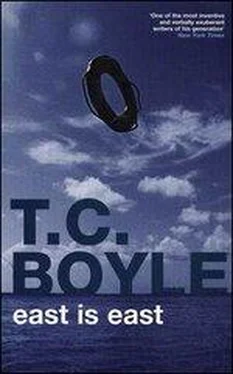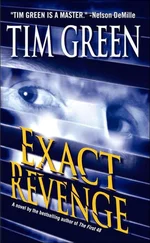Tom Boyle - East is East
Здесь есть возможность читать онлайн «Tom Boyle - East is East» весь текст электронной книги совершенно бесплатно (целиком полную версию без сокращений). В некоторых случаях можно слушать аудио, скачать через торрент в формате fb2 и присутствует краткое содержание. Жанр: Современная проза, на английском языке. Описание произведения, (предисловие) а так же отзывы посетителей доступны на портале библиотеки ЛибКат.
- Название:East is East
- Автор:
- Жанр:
- Год:неизвестен
- ISBN:нет данных
- Рейтинг книги:5 / 5. Голосов: 1
-
Избранное:Добавить в избранное
- Отзывы:
-
Ваша оценка:
- 100
- 1
- 2
- 3
- 4
- 5
East is East: краткое содержание, описание и аннотация
Предлагаем к чтению аннотацию, описание, краткое содержание или предисловие (зависит от того, что написал сам автор книги «East is East»). Если вы не нашли необходимую информацию о книге — напишите в комментариях, мы постараемся отыскать её.
, praised by
in
as "one of the most exciting young fiction writers in America," the result is a sexy, hilarious tragicomedy of thwarted expectations and mistaken identity, love, jealousy, and betrayal.
East is East — читать онлайн бесплатно полную книгу (весь текст) целиком
Ниже представлен текст книги, разбитый по страницам. Система сохранения места последней прочитанной страницы, позволяет с удобством читать онлайн бесплатно книгу «East is East», без необходимости каждый раз заново искать на чём Вы остановились. Поставьте закладку, и сможете в любой момент перейти на страницу, на которой закончили чтение.
Интервал:
Закладка:
Saxby had been wandering. He’d been reprising all the aquariums he’d had as a child, all the guppies, swordtails, mollies and oscars he’d escorted through their brief passage of life, and dreaming of this new project, his inspiration, the one that would bridge his childhood love and the sort of seriousness of purpose expected of a man in his thirtieth year. Now he looked up sharply. “You haven’t been gardening again?”
There were telltale stains of earth on both the sagging knees of his mother’s sagging jeans. She didn’t attempt to deny it.
“Mama, in this heat? You’ll kill yourself yet.”
She waved him off as she might have waved off a fly. “Be a sweet,” she said, “and fetch me a glass of iced tea.”
He crossed the room without a word—angry at her; why, if she must poke around in the garden, couldn’t she do it in the evening?—and went through her bedroom to the back parlor and kitchen beyond it. This was the old core of the house, the original structure around which Saxby’s great-grandfather, DeTreville Lights, had built the house as it now stood. Septima had reserved it to herself, as her private living quarters, when she’d set up the colony twenty years earlier. The kitchen had a low beam ceiling and it was long and narrow, peg and groove floors, thick fieldstone walls over which generations of plaster had been smoothed. It was cool here, the windows shaded by the huge snaking moss-hung oaks that antedated the house. Eulonia White, Wheeler’s daughter, was shelling shrimp at the table. “She’s been gardening again,” he said, and went straight to the refrigerator.
Eulonia White was a well-built woman, fortyish, with bad teeth and a sweet faraway look behind the flashing lenses of her wire-rim glasses. She didn’t respond.
Saxby poured the iced tea from a stoneware pitcher, and as he sliced a round of lemon and the scent of it rose to his nostrils, he suddenly realized he was famished. “That shrimp salad you’re making there, Eulonia?” he asked.
She nodded, her lenses throwing fire. “She say she gone eat in here tonight.”
“How about a little sandwich for me, could you do that? Rye or wheat—check with Rico, I think he’s got both in the main kitchen—with some mayo, black pepper, squeeze of lemon. Okay? I’ll be in with my mother.”
Back in the sitting room, he slipped the cold glass into his mother’s hand, and then picked up the dead egg sandwich—famished, absolutely famished—and gave it a tentative sniff. “I just been sittin’ here watchin’ that aquarium, Saxby,” his mother said, sipping at her iced tea, “and I do swear it is the prettiest one you’ve ever gone and created, but I said to myself, Where are the fee -ish?”
It was closing in on cocktail hour when he pushed himself up and left the room. His mother, the empty glass cradled in her hands and her head thrown back so that the painter’s cap rode like a raft on the permed white swells of her hair, was snoring lightly from the depths of the chair as he eased the door shut behind him. He snatched a towel out of the bathroom, slipped into his swim trunks and dug his mask, snorkel and fins out of the closet. Then he headed out the back door and across the lawn for the boat, figuring to get some exercise in before drinks and dinner turned his limbs to dough.
The sun was so hot on his back it felt ladled on, but it felt good too. He waved to Ina Soderbord, who was sunning herself in one of the lawnchairs, caught a whiff of the ocean and a faint distant snatch of disco music, and then he was in the shadowy fastness of the trees. The smell of life was stronger here, primal, earthy. Butterflies fell like confetti through shafts of light, birds vanished and reappeared, a chameleon the color of astroturf clung to a mossy stump. He felt good. Felt connected. And he saw the remainder of the day opening up before him in a concatenation of simple pleasures: the plunge into the Atlantic, the drifting eternal silence of the ocean floor, the first fragrant sip of vodka, Ruth, crab cakes and endive salad, brandy, billiards, love. The misery of his long vodka-drenched evening in the billiard room was behind him now. It was nothing, an aberration, a misconception: Ruth was playing the game, that was all, she was networking. When he came up on the boat slip he was jubilant, elated, so full of the moment he found himself kicking up his heels and whistling like Uncle Remus himself, his shoulders alight with corny cartoon bluebirds.
But what was this?—there was someone in his boat. Someone long, lanky, the build of a basketball player, L.A. Dodgers cap, acid-washed face: Abercorn. His jubilation was gone, switched off like a light. “Hello,” he said, feeling the mud between his toes, feeling foolish, as if this weren’t his boat, his water, his trees, as if this weren’t the ground on which his ancestors had been born and breathed their last for two centuries and more.
Abercorn was hunched over a yellow notepad and writing furiously, oblivious to Saxby, the day, the drift and tug of the boat on its painter. He was wearing headphones. Saxby followed the connection past Abercorn’s blotched ears, spattered neck and wrinkled collar to the Walkman in his shirt pocket, and figured he was either writing a novel dictated by spirit guides or transcribing the tapes of his interviews with the various boneheads who populated the island. “Hello,” Saxby repeated, raising his voice.
When there was no reaction, he tossed his flippers into the boat, and that was all it took: Abercorn jumped as if he’d been attacked from within, betrayed by his own body. He gaped up—damn, if his eyes weren’t pink, like a bunny’s—and then flipped the ’phones from his ears with a confused wheeze of greeting. “Oh, hey,” he sputtered, looking as if he’d just come back from a long way off, “I’m just, uh—I hope you don’t mind the boat and all, I was just, it was such a nice day, I—” and then, as if the air had run out of his balloon, he fell silent.
“Sure,” Saxby said, hardly less embarrassed than the pink-eyed wonder before him, “no problem. I was just going to take the boat out. For a little swim. That’s all.”
Abercorn made no effort to rise. Instead, he fixed, his suddenly shrewd eyes on Saxby and said, “Mind if I ask you a couple of questions?”
Saxby sighed. The sun was like syrup and everything was drowning in it. “I’ve only got a minute,” he said, stepping into the water, gripping the boat to steady it and then swinging himself nimbly over the side.
Abercorn wanted to hear about the incident at the store—and he wanted more too on that first night on Peagler Sound: What did the Nip look like? how tall was he? did he attack without provocation?—and Saxby obliged him, all the while tinkering with the engine, checking the starter plug, the spare gas tank and the coil of the starter cord. Right in the middle of the store incident, just as Saxby was getting to the good part—how the Japanese guy bundled up his junk food and lowered his shoulder like a fullback and shot past him out the door—Abercorn interrupted him. “You know—could I ask you something?” he said.
Ask him something? Wasn’t that what he was doing?
“Something personal, I mean.”
Saxby fiddled with the engine. “Sure,” he said. “Go ahead.”
“It’s your accent. I mean, I’m from L.A., and everybody down here sounds like they just stepped out of Dogpatch or something—no offense—but you don’t have it. You are from around here, right?”
It was a question he’d been asked a thousand times, and the answer was equivocal: he was and he wasn’t. He’d been born in Savannah, yes, and he was heir to half the island, even if he did talk like a Yankee. But the reason he talked like a Yankee was that he’d spent half his life—the formative half—in New York and Massachusetts. That was his father’s doing. Grandfather Saxby wasn’t even cold yet in the grave when Marion Lights uprooted Septima and her year-old son and moved them up to Ossining, New York, on the Hudson River. The family had from time immemorial owned a controlling interest in a big antiquated factory there that produced yeast, margarine, gin, vodka and the callowest whiskey known to man. Till Marion came along, the family had been content to manage the place from afar, but he had different ideas. He gave over the administration of the Tupelo Island estate (which was then called Cardross, after Cardross Lights, founder of the original plantation that had managed to survive intact through six generations of Lights, drought, flood, capricious cotton prices, carpetbaggers, boll weevils and a host of ravenous developers from the mainland) to a wily old former overseer by the name of Crawford Sheepwater, and moved north to become a Captain of Industry.
Читать дальшеИнтервал:
Закладка:
Похожие книги на «East is East»
Представляем Вашему вниманию похожие книги на «East is East» списком для выбора. Мы отобрали схожую по названию и смыслу литературу в надежде предоставить читателям больше вариантов отыскать новые, интересные, ещё непрочитанные произведения.
Обсуждение, отзывы о книге «East is East» и просто собственные мнения читателей. Оставьте ваши комментарии, напишите, что Вы думаете о произведении, его смысле или главных героях. Укажите что конкретно понравилось, а что нет, и почему Вы так считаете.











